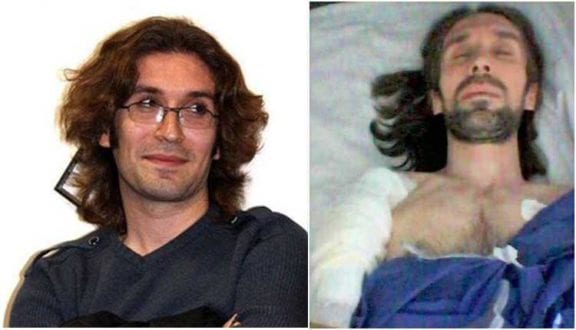iran-hrm – Prison authorities prevented Arash Sadeghi of a pre-arranged appointment with a specialist in Tehran’s Khomeini hospital on October 6. Prosecutor’s office reportedly did not issue the required permission for Arash Sadeghi to be taken to hospital.
The human rights defender is suffering a serious infection in his surgical wound.
This is not the first time that the authorities are torturing Sadeghi by deliberately depriving him of medical treatment.
Have continuously denied the 31-year-old vital medical care since he went on hunger strike in late 2016 protesting the imprisonment of Golrokh Ebhraimi Iraee, also a human rights defender and his wife.
Sadeghi under went a major surgery which lasted seven hours on September 12. He was transferred back to Rajaie Shahr prison on September 15. This was against strict explicit medical advice that required him to spend at least 25 days hospitalized following the operation so that he could be monitored by specialist doctors.
On September 22, Arash Sadeghi was booked for a morning appointment with his cancer surgeon who had specified his availability being limited to the morning. However, the prison guards transferred Arash Sadeghi in the afternoon, by which time the surgeon was no longer present.
On his way back to prison, Commander of the Protection Unit Maghsoud Zolfali, and the warden of Rajaie Shahr Prison Gholamreza Ziaie, threatened Sadeghi with denying him medical treatment.
Arash Sadeghi was instead examined by a general practitioner who diagnosed a serious infection in his surgical wound. The general practitioner assessed that the infections would have been much less likely if Arash Sadeghi had been hospitalized following his operation as advised by the specialist doctors.
In a September 26 statement, Amnesty International called on Iranian authorities to immediately and unconditionally release Arash Sadeghi who is “is being solely punished for his peaceful human rights activities, including communicating with Amnesty International and providing the organization with information on the human rights situation in Iran.”
“The Iranian authorities’ treatment of Arash Sadeghi’s is not only unspeakably cruel; in legal terms it is an act of torture. Every step of the way, the prison authorities, the prosecutor’s office and the Revolutionary Guards have done everything they can to hinder and limit access to the essential treatment that Arash requires in order to address his life-threatening cancer,” said Philip Luther, Research and Advocacy Director for the Middle East and North Africa at Amnesty International.
 Shabtabnews In this dark night, I have lost my way – Arise from a corner, oh you the star of guidance.
Shabtabnews In this dark night, I have lost my way – Arise from a corner, oh you the star of guidance.



